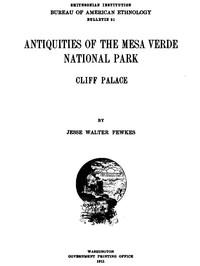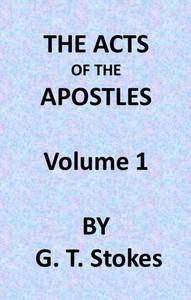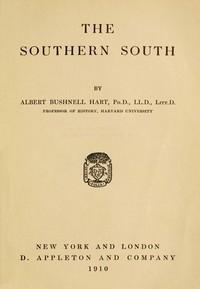|
|
Read this ebook for free! No credit card needed, absolutely nothing to pay.Words: 40203 in 12 pages
This is an ebook sharing website. You can read the uploaded ebooks for free here. No credit cards needed, nothing to pay. If you want to own a digital copy of the ebook, or want to read offline with your favorite ebook-reader, then you can choose to buy and download the ebook.

: Antiquities of the Mesa Verde National Park: Cliff Palace by Fewkes Jesse Walter - Mesa Verde National Park (Colo.); Colorado Antiquities@FreeBooksWed 07 Jun, 2023 APPENDICES PAGE A. PERSONNEL OF THE POST OFFICE 189 B. EXTRACTS FROM THE EARLY REGULATIONS REGARDING THE MAIL SERVICE 191 C. METHODS OF TRAVEL IN EARLY DAYS 195 D. STATEMENT SHOWING THE WORK OF THE POST OFFICE SAVINGS BANK FROM 1882 TO 1918 197 E. STATEMENT OF INLAND MONEY ORDERS ISSUED IN INDIA SINCE 1880 198 F. HISTORICAL ASSOCIATIONS OF THE CALCUTTA GENERAL POST OFFICE 200 G. EXTRACT FROM THE NARRATIVE OF THE INTERRUPTION IN THE MAIL ARRANGEMENTS IN THE N.-W.P. AND PUNJAB SUBSEQUENT TO THE MUTINY AT MEERUT AND DELHI ON THE 10TH AND 11TH MAY, 1857, BY MR. G. PATON, POSTMASTER-GENERAL, NORTH-WEST PROVINCES 204 H. THE WORK OF THE FIELD POST OFFICE BETWEEN 1867 AND 1912 210 J. THE POST OFFICE INSURANCE FUND 232 INDEX 241 THE POST OFFICE OF INDIA THE POST OFFICE OF INDIA AND ITS STORY THE POST OFFICE OF INDIA To anyone connected with the work of the Post Office of India it is almost inconceivable that the present institution, with its vast organization and its elaborate system, has grown up in the course of little more than half a century. Previous to 1854 the Post Office was a medley of services in different provinces, each having separate rules and different rates of postage. Regular mails were conveyed over a very few main lines between important towns, and Collectors of districts were responsible for the management of their own local post offices. There were no postage stamps, and since rates were levied according to distance, and distances were often unknown, the position of a postal clerk in a large office was a distinctly lucrative one. In large cantonments a military officer with plenty of other duties was usually postmaster, and his supervision was at best sketchy, especially during the snipe shooting season. In 1850 a Commission of the kind with which we are now so familiar both in India and England was appointed to consider the state of the postal services, and the result of its deliberations was the Post Office Act of 1854 and the conversion of the Post Office into an Imperial Department under a single head called the Director-General. Uniform rates of postage were introduced and postage stamps instead of cash payments were brought into use. That marvellous set of rules known as the Post Office Manual was prepared, which has since grown into four healthy volumes. Every Official in the Department is supposed to have the contents of these at his fingers' ends, but in reality few have ever read them through, and anyone who attempted to obey all their instructions would find himself sadly hampered in the exercise of his duties. The appointment of a Director-General, by bringing the separate services under a single administration, laid the foundation for future progress. Suitable officers were recruited and were taught their duties, better pay and improved prospects of promotion were a great inducement to the staff to take an interest in the work, and through communications which took no account of district or provincial boundaries were established. The gradual growth of the powers of the Director-General has largely depended on the needs of the Department, and also, to an appreciable extent, upon his own strength of will and his personal relations with the Member of Council, who controls the Department of Government to which the Post Office is subordinate. The Director-General is assisted by two Deputy Directors, who are, in fact, the Secretaries of the Post Office, and under these again are four Assistant Directors in charge of four main branches of Post Office work. All the above officers have the title "General" attached to their designations in order to increase their self-respect, but I have omitted it to avoid an annoying reiteration. Of the three personal assistants, one has to be a walking encyclopaedia since he is in personal attendance on the Director-General; the others are financial and technical experts. The office itself is under the immediate supervision of a titled Bengalee gentleman of considerable attainments, and his clerks are mostly Bengalee graduates whose abilities are supposed to vary with their salaries. For the purposes of administration, the whole of India and Burma is divided into eight circles, corresponding with Presidencies and Provinces as far as possible. Each of these is under the control of a Postmaster-General, who is sometimes a member of the Indian Civil Service and sometimes an official of the Department. The powers of a Postmaster-General are great, his patronage is large and the working of the Post Office is dependent on his capacity for railway travelling at all seasons of the year. His circle is divided into divisions in charge of Superintendents, who should be little understudies of himself. The real business of the Department, however, is performed by post offices, and these are divided into head, sub and branch offices. The head office is the account and controlling office of one or more districts and is in charge of a postmaster, who in large towns ranks as a divisional officer. The sub-office is under the control of a head office for account purposes. It does all kinds of postal work and is always opened where there is a sufficiency of correspondence to justify its existence. The branch office is only intended for villages and places where there is no need of a sub-office. It is really the pioneer of the Department for the purpose of opening up new areas to postal communications. In small places a branch office is put in charge of a schoolmaster, a shopkeeper or any other local resident who has sufficient education to keep the very simple accounts required, and by this means the Post Office is able to give the advantages of its great organization to villages which could never support a departmental office. A still cheaper agency is used for the outlying hamlets, which only receive and send a few letters a week. These are visited periodically by the village or rural postman, who is a kind of perambulating branch office. He delivers letters and money orders, and also receives articles for despatch. He sells stamps and quinine, and being a local man he has to face a certain amount of public opinion if he doesn't act fair and square towards the villagers in his beat. In some hill tracts he is provided with a bugle to announce his arrival, and to the inhabitants of these he brings news of the outside world; he writes their letters and explains to them his own conception of the mysteries of the money order system. But what would be the use of all these offices and all this organization without lines of communication? The chief lines are, of course, the railways, but they form a separate organization and will be discussed in another chapter. For places off the railway there are motor lines and tonga services, such as that sung by Kipling between Kalka and Simla but now a thing of the past owing to the completion of the hill railway. The romance of the Post Office, however, must always lie in the mail runner, or hirkara as he is called in old books on India. The number of tigers sated with his flesh is past count, the Himalayan snows have overwhelmed him, flooded rivers have carried him off and oozy swamps sucked him down. But in the face of all these dangers, has the runner ever failed to do his duty? According to the stories, never, and in real life perhaps not more than once or twice. Is the torrent in spate? He must ford it or swim. Has the rain wrecked the road? He must climb by the cliff. The service admits not a but, nor an if, While the breath's in his mouth, he must bear without fail In the name of the Emperor--the "Overland Mail."--KIPLING. Free books android app tbrJar TBR JAR Read Free books online gutenberg More posts by @FreeBooks
: The Expositor's Bible: The Acts of the Apostles Vol. 1 by Stokes George Thomas Nicoll W Robertson William Robertson Sir Editor - Bible. Acts Commentaries; Bible. Acts Criticism interpretation etc.@FreeBooksWed 07 Jun, 2023

: The Southern South by Hart Albert Bushnell - United States Race relations; Southern States Social conditions@FreeBooksWed 07 Jun, 2023
|
Terms of Use Stock Market News! © gutenberg.org.in2025 All Rights reserved.






